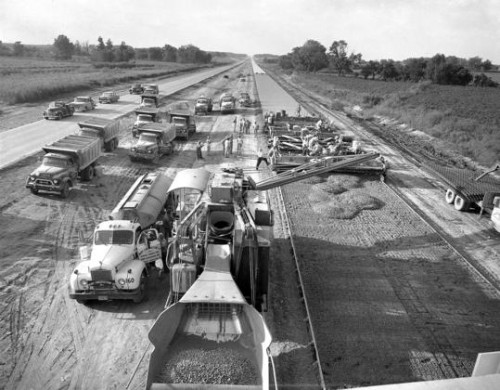Commercial Asphalt and Concrete Industry Celebrates 60 Years of Interstate
2016 marks the 60th anniversary of the Federal Highway Act of 1956 and the construction of the Interstate Highway System. Commercial paving contractors nationwide acknowledge the ongoing project that changed the commercial paving industry forever.

—
The Federal Aid Highway Act of 1956, spearheaded by President Dwight D. Eisenhower, forever transformed how American motorists travel. By creating the Interstate Highway system of nearly 50,000 miles of endless, interconnected roadway, Americans could easily get from coast to coast, border to border without ever leaving the highway.
The initial concept of the Interstate Highway System was first proposed in the mid 1920’s, then again by Eleanor Roosevelt in post WWII 1945 as a means to employ the thousands of returning soldiers. The concept was shelved by Harry S. Truman but revived by the outspoken and newly elected “Ike” in 1953 and approved and implemented in 1956.
As a result of the Interstate Highway System, commercial paving contractors sprung up in droves across the country, many still in operation today. As the 60th Anniversary is celebrated by highwaymen from coast to coast, the development of sustainable and environmentally compatible materials for paving has taken hold.
“The Interstate Highway System was a great idea and established the concrete and paving industry solidly in the American industrial world,” commented ACS Asphalt founder and co-owner, Jeff Taylor. “But today, things are very different. We’re more ecologically and environmentally aware than back then and realize that simply laying down a strip of concrete isn’t enough.”
Advancements in asphalt and concrete mixtures over the past six decades have both improved wear and increased longevity of the Interstate Highway System while producing more sustainable, environmentally “friendly” materials than in the past.
“What we use today for roadways is nothing like what those hard working men used in Pennsylvania and Missouri for the first interstate highways,” explained Taylor. “All those original highways and turnpikes have long ago been replaced with more modern materials, much of which is RAP, reclaimed asphalt pavement and concrete. Basically, recycled materials.”
The development of “warm” mix paving materials is one aspect of the commercial paving industry that directly addresses environmental issues.
“It’s nearly impossible to produce completely ‘green’ paving materials,” Taylor continued. “But the industry continues to strive toward that with mixes like ‘warm’ mixes that use less energy to produce, produce less emissions and maintain a certain amount of sustainability by re-using the same materials again and again.”
While the Interstate Highway System celebrates its 60th year in existence, the reality is that no one highway built in the early days of the project is still comprised of its original materials.
“Even the ‘Grandaddy of the Pikes,’ the Pennsylvania turnpike, has been re-built and re-surfaced many times,” continued Taylor. “Honestly, the Interstate Highway System has done far more for America than allow motorists a smooth and simple way to get around. It’s also created many jobs for commercial asphalt and concrete paving contractors, increased production in the asphalt and concrete industry and resulted in progressively more sustainable and long lasting paving materials.”
For more information on ACS Asphalt, Commercial Asphalt, Concrete, Excavation and Paving, visit: www.acsasphalt.com
**JD Arbuckle is a freelance journalist specializing in consumer education on a variety of topics including commercial asphalt, concrete and paving.
For more information about us, please visit http://www.acsasphalt.com
Contact Info:
Name: JD Arbuckle
Organization: ACS Asphalt, Commercial Asphalt, Concrete, Excavation and Paving
Release ID: 102212